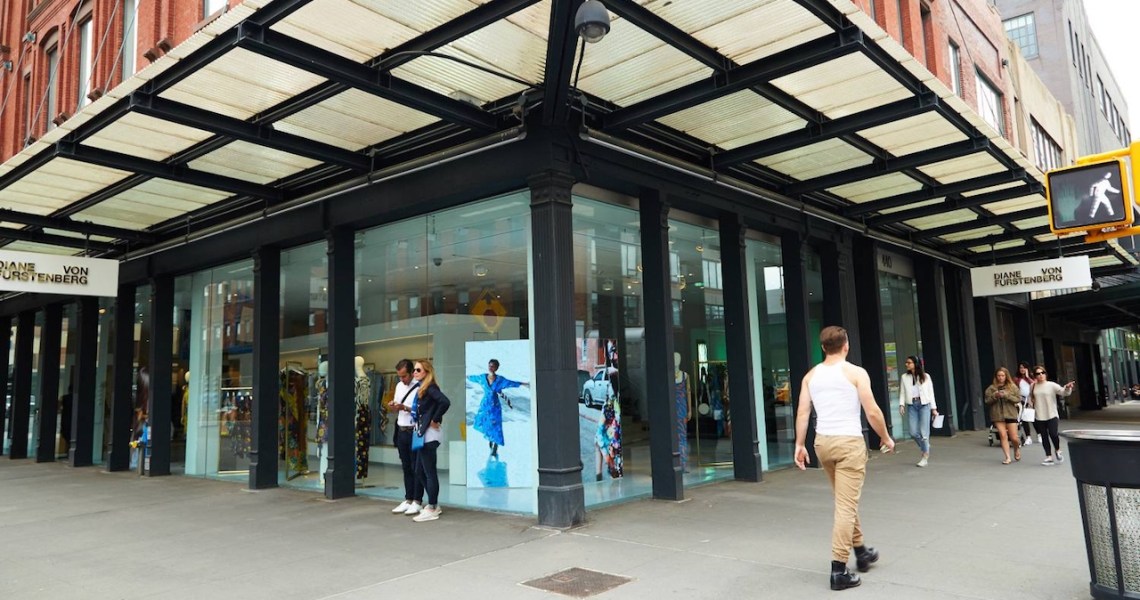On Wednesday morning, Diane von Furstenburg CEO Gabby Hirata hosted a livestream shopping event on the brand’s Tmall account from its Meatpacking District New York City store to count down to the beginning of China’s annual “Double Eleven” or Singles’ Day shopping event. Within the first five minutes, 5,000 people in China had tuned in. Some products garnered nearly 50,000 likes, drawn in by the brand’s traditional 22% off Singles’ Day sale.
Hirata, a native of Beijing, said that both the DVF brand and the founder Diane von Furstenburg herself, have confidence in the Chinese market’s capacity for continued growth. Having sold in China for more than 10 years, Tmall and Alibaba alone now make up more than 9% of the brand’s total China sales.
Singles’ Day drives a frenzy of local shopping every year, with participating brands typically offering exclusive merchandise and discounts for the event. Even brands that don’t yet sell in China have likely seen the big sales numbers reported by Alibaba and other Chinese retailers each November. Last year, Alibaba reported $74 billion in sales across the event, though the retailer reportedly may not report a Singles’ Day sales number this year after pressure from Chinese government regulators. Competitor JD.com made $40 billion at Singles’ Day last year.
This year, 290,000 brands selling on Alibaba are participating in its 11.11 shopping event. DVF, Mansur Gavriel and Supergoop are heavily investing in Singles’ Day by hosting big promotions. They’re also using Tmall’s livestreaming features both to drive revenue and trial retail concepts for other markets.
Hirata said that success in the Chinese market came after careful observation of the customer. DVF’s Chinese customer is younger than its typical audience in the U.S., with their average age being 25 to 40. The brand’s core American customer is 27 to 50. Originally, Hirata thought the younger audience might prefer a simpler and more affordable product, so DVF stocked its Tmall store with T-shirts and accessories. But it was the inclusion of the wrap dress, an iconic and more expensive piece from the brand’s catalog, that set the brand on a path of growth.
“We realized that what they wanted was something that was recognizably DVF,” Hirata said, after a panel discussion hosted by Alibaba in the Meatpacking District on Wednesday. “The wrap dress immediately became the best-selling product.”
She added, “People don’t have the patience to scroll through your entire collection. And there are so many players on there. It’s better to focus on one hero product to stand out.”
Mansur Gavriel, comparatively, is much newer to the Chinese market. The brand launched in China in early 2021 and on Tmall two months ago. But Isabelle Fevrier, CEO of Mansur Gavriel, said the brand has already gained insight that it hopes to apply to its marketing strategy both in China and around the world. For example, this year, it will be working with Chinese influencers like Mr. Bags, aka Tao Liang, to market on Chinese social media. That’s in addition to hosting Singles’ Day promotions and livestreams throughout the week.
“We made our first step into livestreaming last month,” Fevrier said at the Alibaba event. “China, as in many things, is a leader in that. We’ve also been talking to a lot of KOLs in China, and that’s helped us to stop focusing so much on the U.S. for marketing. We’ve been trying to think of what influencers and what advertising strategies can work on a global basis. It’s not [about having] a U.S. strategy and a separate international strategy, but [rather] having a global strategy.”
Alibaba has a market value close to $500 billion and has billed itself up as the premier gateway for non-Chinese brands to enter the China market. It pitches China as a place where brands must sell to avoid potentially missing out on millions of dollars in revenue, and as a leader in showing what retail concepts and shopping behaviors may become mainstream.
For example, Alibaba Group president Michael Evans said that livestreaming is the most important tool for customer engagement in China right now. Last year, the Chinese livestreaming business was valued at more than $170 billion by McKinsey. More than 700 celebrities and influencers, both Chinese and not, will host Singles’ Day livestreams — and the model is already inching into the west through platforms like Instagram.
“Fashion brands wouldn’t be where they are today without China,” Evans said in a video address to attendees of the Alibaba Singles’ Day event in New York. “If you want to know what the future of retail will look like, look at China.”




